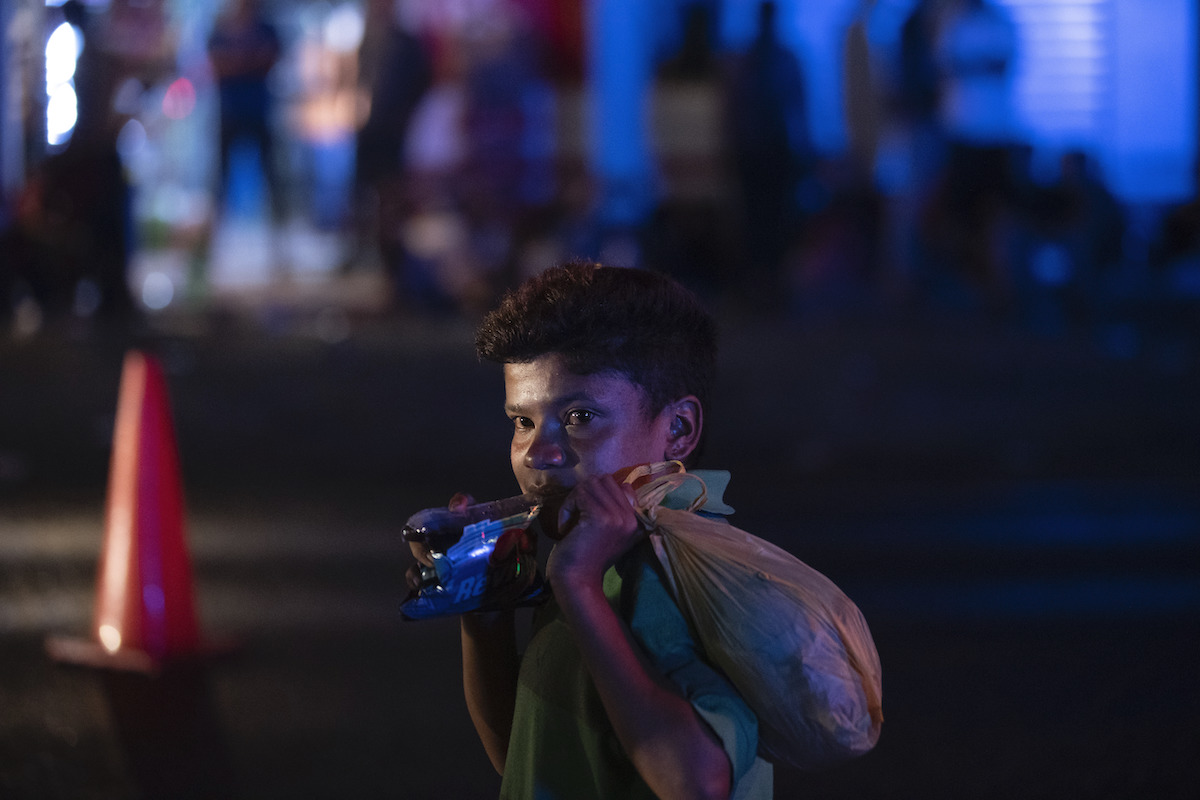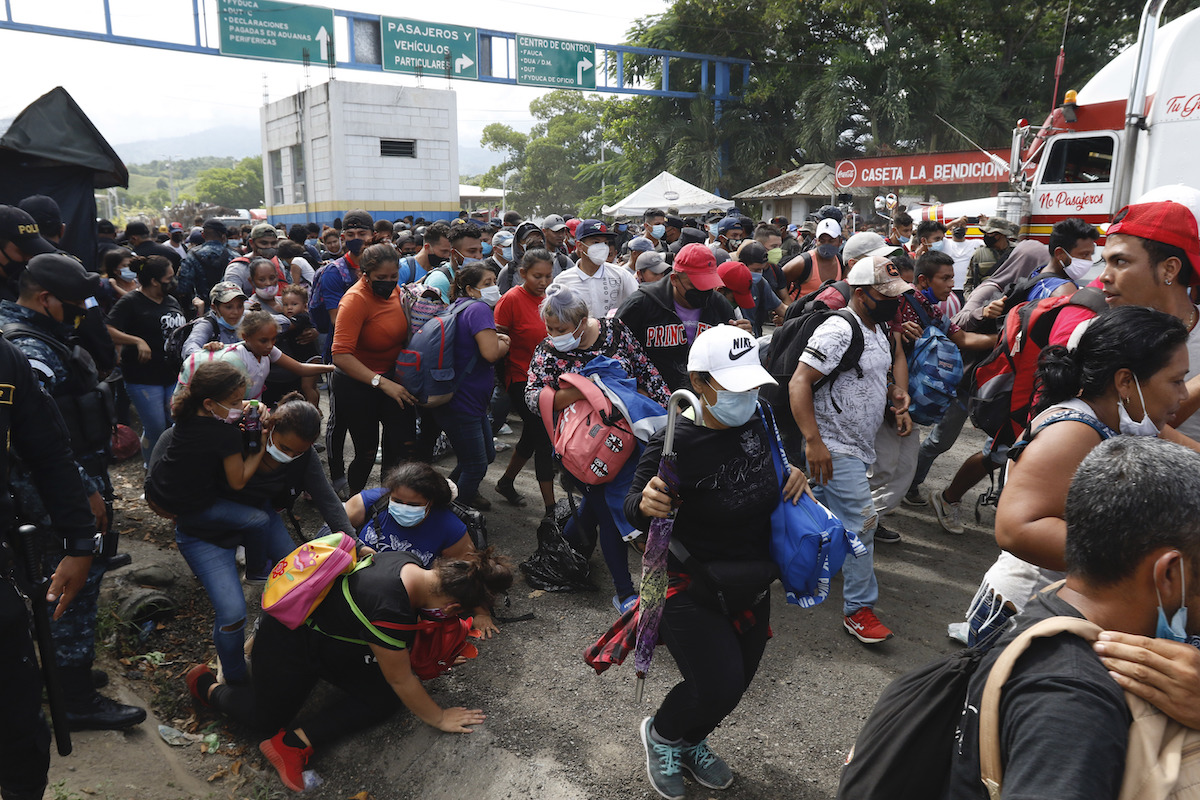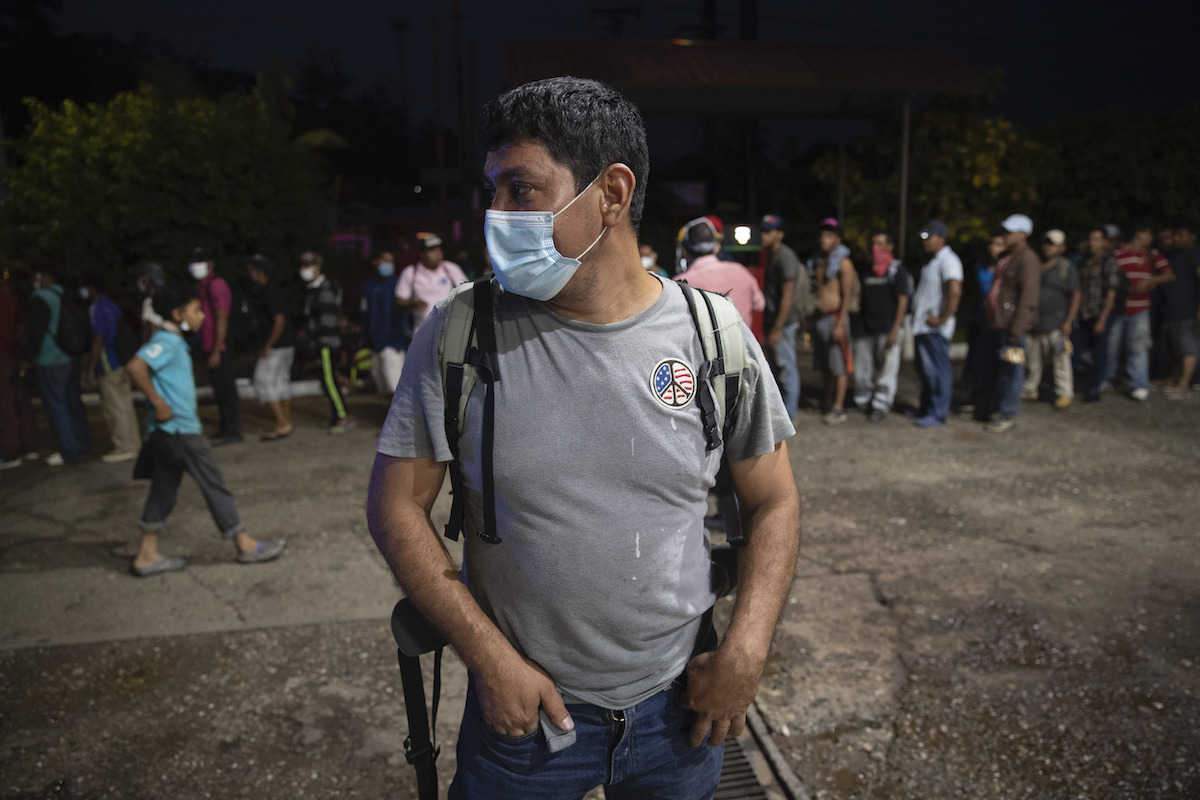

A teenager who identified himself as Jorge, drinks water as he rests with a group of Honduran migrants, in Morales, Guatemala, Thursday, October 1, 2020. (AP Photo/Moisés Castillo)
By SONIA PÉREZ D. and CLAUDIO ESCALÓN, Associated Press
MORALES, Guatemala (AP) — Guatemala vowed to detain and return members of a new caravan of about 2,000 migrants that set out from neighboring Honduras in hopes of reaching the United States, saying they represent a health threat amid the coronavirus pandemic.
While it was reminiscent of 2018 —when a caravan started out just before key U.S. elections— this year it was clear that times had changed, in part because of fears of contagion.
Soon after the Honduran migrants entered Guatemala on foot Thursday, overwhelming border guards, Guatemalan President Alejandro Giammattei vowed to return them to Honduras, citing efforts to contain the pandemic.
“The order has been given to detain all those who entered illegally, and return them to the border of their country,” Giammattei said in a broadcast address to the nation. “We will not allow any foreigner who has used illegal means to enter the country, to think that they have the right to come and infect us and put us at serious risk.”
Giammattei issued an order that would suspend some constitutional rights in the provinces they were expected to pass through, apparently in order to facilitate detaining them.
Authorities had planned to register the migrants as they crossed earlier Thursday and offer assistance to those willing to turn back, but the group crossed the official border at Corinto without registering, pushing past outnumbered Guatemalan police and soldiers who made little attempt to stop them.


Migrants attempt to cross the border from Corinto, Honduras, into Corinto, Guatemala, Thursday, October 1, 2020. (AP Photo)
Many didn’t make it far into Guatemala before having to stop for the night. Most appeared to be young men, though there were a few small children being pushed in strollers.
María Elena Hernández, 42, who once worked as a cook, was sitting in the rain Thursday by the side of the road, seeking a bit of shelter under a piece of metal roofing with her daughter and 8-year-old granddaughter.
Hernández said she heard about the caravan on Facebook. She said the last job she had was months ago at a corner store, but the business closed down due to the pandemic.
Around her, many migrants didn’t even wear masks; they were more concerned about staying dry, and looking for a bit of food or water. The migrants have split into smaller groups as they trudged along the highway toward Mexico.
In one group were four teenagers, all friends and neighbors from San Pedro Sula, from which hundreds of migrants had set out the Wednesday night. The teens decided to leave after seeing others organize on Facebook.
The youngest, 15-year-old Josty Morales, said he wanted to live the “American dream” and was looking for a way to support his 6-month-old son at home.
“There’s no work. The necessity strangles you,” he said.
Within hours of the border crossing, Guatemalan authorities reported the first migrant death. A person tried to climb aboard a moving flatbed trailer, but fell under its wheels. Authorities did not immediately provide any additional details.
Central American migrants began traveling in large groups in recent years, seeking safety in numbers and in some cases avoiding the cost of smugglers. Calls for a new migrant caravan to leave October 1 had circulated for weeks on social media.


Migrants from Honduras arrive at a gas station/food mart in Morales, Guatemala, Thursday, Oct. 1, 2020, as they make their way to the United States-Mexican border. (AP Photo/Moisés Castillo)
The odds of a large migrant caravan reaching the U.S. border, already low, have grown increasingly slim over the past year. Under pressure from the United States, Mexico deployed its National Guard and more immigration agents to break up attempted caravans last year. They dispersed large groups of migrants attempting to travel together in southern Mexico. Actually crossing into the U.S. legally is virtually impossible now with pandemic, and entering illegally is as difficult as ever.
The departure of the new group was reminiscent of a migrant caravan that formed two years ago shortly before U.S. midterm elections. It became a hot issue in the campaign, fueling anti-immigrant rhetoric. While the caravans draw attention, they really only account for a small fraction of the daily migration flow by small groups that pass unnoticed through Central America and Mexico.
At the Honduras border early Thursday, Guatemalan officials asked the migrants to provide documents showing a negative COVID-19 test—even though last week they said they wouldn’t require a test for those spending less than 72 hours in the country.
But about 2,000 migrants hustled through without registering. In addition, AP journalists saw others crossing the border illegally near the formal crossing. There were no reports of violence.
Guatemala’s military said it was establishing interior checkpoints to review migrants’ documents. In the past, authorities have set up roadblocks deeper in the country to winnow down larger groups. A regional agreement allows citizens of Honduras to transit through Guatemala.
Governments throughout the region made it known they were watching Wednesday.
Mexico’s immigration agency said in a statement that it would enforce “safe, orderly and legal” migration and not do anything to promote the formation of a caravan. The U.S. Embassy in Honduras said on Twitter Wednesday that migration to the U.S. was more difficult than ever right now—and more dangerous because of the coronavirus.
El mensaje de Mexico está claro y firme: no se permitirá el ingreso de caravanas de migrantes, sigue vigente la pandemia de COVID-19 y el viaje irregular conlleva un mayor riesgo de ser objeto de la delincuencia. No se deje engañar ni arriesgue su vida! https://t.co/PkNDFDWHOF pic.twitter.com/7Nrb5Bf9I2
— CBP Mark Morgan (@CBPMarkMorgan) October 1, 2020
The flow of migrants north from Central America had slowed dramatically during the pandemic as countries throughout the region closed their borders. Most migrant shelters along the principal routes closed their doors to new arrivals as they tried to keep the virus from spreading to vulnerable populations. Mexico and the United States deported hundreds of migrants back to their home countries to try to empty detention centers.
Christian Martínez, 19, saw leaving as a way out when few other options were apparent in Honduras. “If we stay what is left for us is to become criminals because there’s no way to survive,” he said.
***
Escalón reported from Corinto, Honduras. Associated Press writer Christopher Sherman in Mexico City contributed to this report.


